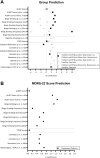Masculine depression and its problem behaviors: use alcohol and drugs, work hard, and avoid psychiatry!
- PMID: 36855002
- PMCID: PMC10914846
- DOI: 10.1007/s00406-023-01567-0
Masculine depression and its problem behaviors: use alcohol and drugs, work hard, and avoid psychiatry!
Abstract
The gender role influences vulnerability to mental illness. Substance use, even critical in scale, is perceived as masculine, just like hard (over-)work, while not seeking help. With the ongoing separation between gender and sex, masculine norms become more relevant also to females' mental health. The male depression concept highlights the role of male symptoms in affective disorders. However, the empirical evidence is still limited. Here, we use the denomination 'masculine depression' to open the category for female patients and tested substance use patterns, health services' utilization, and working hours as predictors in a case-control study of 163 depressed in-patients (44% women; masculine vs. non-masculine depression according to a median split of the Male Depression Rating Scale-22) and 176 controls (51% women). We assessed higher depression severity in patients with masculine (vs. non-masculine) depression. Masculine depression (vs. non-masculine depression and vs. no depression) was predicted by more frequent and critical use of alcohol (including binge drinking), tobacco, and illicit drugs, and by longer working times. Moreover, fewer health services contacts due to mental complaints during the previous year were associated with masculine (vs. non-masculine) depression. Alarmingly, even critical substance misuse was not significantly associated with more frequent health services contacts; however, the higher the depression severity, the more contacts the patients reported. Here, we provide evidence that patients with masculine depression are highly burdened and undertreated, which applies equally to female and male patients. This study identified promising targets to establish specialized care offers.
Keywords: Alcoholism; Drug use; Help seeking; Male depression; Masculine depression; Nicotine; Substance use.
© 2023. The Author(s).
Conflict of interest statement
The authors declare that the research was conducted in the absence of any commercial or financial relationships that could be construed as a potential conflict of interest.
Figures

Similar articles
-
Dimensions of Masculine Norms, Depression, and Mental Health Service Utilization: Results From a Prospective Cohort Study Among Emerging Adult Men in the United States.Am J Mens Health. 2020 Jan-Feb;14(1):1557988320906980. doi: 10.1177/1557988320906980. Am J Mens Health. 2020. PMID: 32079448 Free PMC article.
-
Masculine Traits and Depressive Symptoms in Older and Younger Men and Women.Am J Mens Health. 2018 Jan;12(1):19-29. doi: 10.1177/1557988315619676. Epub 2015 Dec 3. Am J Mens Health. 2018. PMID: 26634856 Free PMC article.
-
Adolescent gender norms and adult health outcomes in the USA: a prospective cohort study.Lancet Child Adolesc Health. 2019 Aug;3(8):529-538. doi: 10.1016/S2352-4642(19)30160-9. Epub 2019 May 30. Lancet Child Adolesc Health. 2019. PMID: 31155319 Free PMC article.
-
Under-Researched Demographics: Heavy Episodic Drinking and Alcohol-Related Problems Among Asian Americans.Alcohol Res. 2016;38(1):17-25. Alcohol Res. 2016. PMID: 27159808 Free PMC article. Review.
-
How does drug and alcohol misuse develop among people with psychotic illness? A literature review.Soc Psychiatry Psychiatr Epidemiol. 2001 Jun;36(6):269-76. doi: 10.1007/s001270170044. Soc Psychiatry Psychiatr Epidemiol. 2001. PMID: 11583456 Review.
Cited by
-
Exploring hypermasculinity as a moderator between sexual violence victimization and adverse mental health effects among sentenced incarcerated men.J Mens Health. 2024 Oct;20(10):89-100. doi: 10.22514/jomh.2024.169. Epub 2024 Oct 30. J Mens Health. 2024. PMID: 40342627 Free PMC article.
-
Influences of sex and gender on the associations between risk and protective factors, brain, and behavior.Biol Sex Differ. 2024 Nov 26;15(1):97. doi: 10.1186/s13293-024-00674-4. Biol Sex Differ. 2024. PMID: 39593154 Free PMC article. Review.
-
Validation of a gender-specific binary depression screening version (GIDS-15) in two German samples.Front Psychiatry. 2025 Apr 24;16:1469436. doi: 10.3389/fpsyt.2025.1469436. eCollection 2025. Front Psychiatry. 2025. PMID: 40343099 Free PMC article.
-
Associations of depressive symptoms, social engagement and support, and lifestyle behaviors among non-Hispanic black and Hispanic men with chronic conditions in the United States.Front Public Health. 2025 Jun 16;13:1600818. doi: 10.3389/fpubh.2025.1600818. eCollection 2025. Front Public Health. 2025. PMID: 40589810 Free PMC article.
-
TaKeTiNa Music Therapy for Outpatient Treatment of Depression: Study Protocol for a Randomized Clinical Trial.J Clin Med. 2024 Apr 24;13(9):2494. doi: 10.3390/jcm13092494. J Clin Med. 2024. PMID: 38731019 Free PMC article.
References
-
- Jacobi F, et al. Psychische Störungen in der Allgemeinbevölkerung. Nervenarzt. 2014;85(1):77–87. - PubMed
MeSH terms
Grants and funding
LinkOut - more resources
Full Text Sources
Medical

